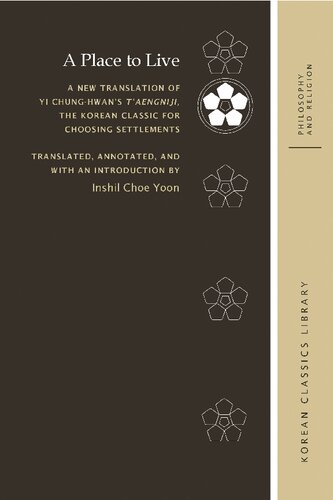

Most ebook files are in PDF format, so you can easily read them using various software such as Foxit Reader or directly on the Google Chrome browser.
Some ebook files are released by publishers in other formats such as .awz, .mobi, .epub, .fb2, etc. You may need to install specific software to read these formats on mobile/PC, such as Calibre.
Please read the tutorial at this link. https://ebooknice.com/page/post?id=faq
We offer FREE conversion to the popular formats you request; however, this may take some time. Therefore, right after payment, please email us, and we will try to provide the service as quickly as possible.
For some exceptional file formats or broken links (if any), please refrain from opening any disputes. Instead, email us first, and we will try to assist within a maximum of 6 hours.
EbookNice Team

Status:
Available0.0
0 reviewsA Place to Livebrings together in a single volume an introduction to Yi Chung-hwan’s (1690–1756)T’aengniji(Treatise on Choosing Settlement)―one of the most widely read and influential of the Korean classics―and an annotated translation of the text, including the author’s postscript.
Yi composed theT’aengnijiin the 1750s, a time when, despite King Yŏngjo’s (r. 1724–1776) policy of impartiality, the scholar-gentry class continued to identifiy strongly with literati factions and to participate in the political scene as such. A prominent secretary who had his career cut short because of suspected involvement in one of the largest literati purges at court, Yi endured long periods of living in exile before finishing theT’aengnijiin his early sixties. The treatise, his only substantial work, is based largely on his travels throughout the Korean peninsula and presents not only his views on the desirability of places for settlement, but also his opinions on contemporary matters and criticism of government policy. As a result, theT’aengnijicirculated as an anonymous work for many years. Employing the latest research onT’aengnijimanuscripts, translator Inshil Yoon maintains in her introduction that the original title of the treatise wasSadaebu kagŏch’ŏ(Livable Places for the Scholar-Gentry); she goes on to discuss in detail its reception by premodern and contemporary scholars and the treatise’s ongoing popularity as evidenced by the numerous versions and translations done in this and the previous century, its having been made into a novel, and current usage of “t’aengniji” as a noun meaning “regional geography” or “travelogue.”
The present translation is based on the Chosŏn Kwangmunhoe edition.